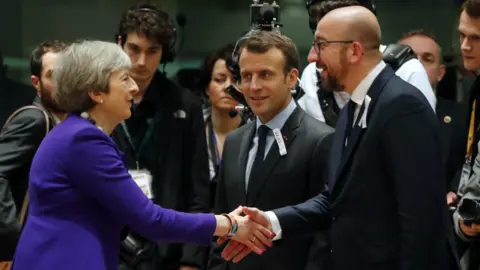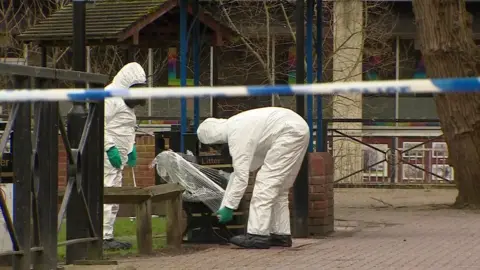Russian spy: UK accused of leading 'anti-Russian campaign'
 Reuters
ReutersRussia has accused the European Union of following an "anti-Russian campaign launched by London" over the nerve agent attack on a former double agent.
Moscow denies responsibility for the attack on ex-spy Sergei Skripal and his daughter Yulia in Salisbury on 4 March.
The bench the pair were sitting on when they were found unconscious has been removed by a team in protective suits, as the investigation continues.
On Thursday, the EU said it was "highly likely" Russia was behind the attack.
The European Council said it stood in "unqualified solidarity" with the UK, after Prime Minister Theresa May briefed her counterparts on the poisoning.
Ms May welcomed the EU support, saying that it was right "we are standing together" as the threat posed by Russia "respects no borders and it is a threat to our values".

French President Emmanuel Macron, who is leaving the summit in Brussels amid a hostage situation in southern France, said France and Germany would take "rapid, coordinated measures" in response to the Salisbury attack.
He and Germany's Chancellor Angela Merkel plan to announce a series of steps against Moscow soon.
Artyom Kozhin, Russia's foreign ministry spokesman, said the move had the "obvious purpose of creating yet another obstacle to normalising the situation on the European continent".
He said: "We regret that the EU chose to follow another anti-Russian campaign launched by London and its allies from across the ocean."
Former Russian spy Mr Skripal and his daughter Ms Skripal remain in a critical but stable condition, weeks after being found slumped on a shopping centre bench.
A policeman left critically ill after responding to the incident has been discharged from hospital.
Meanwhile, the 23 British diplomats ordered out of Russia in a tit-for-tat response to the UK's expulsion of 23 of its diplomats have now left the UK's embassy in Moscow.
The EU has recalled its ambassador to Russia, German Markus Ederer, "for consultations" and he is expected in Brussels over the weekend.
President Putin has called for the Russian people to unite behind him during what he called a "challenging time".
